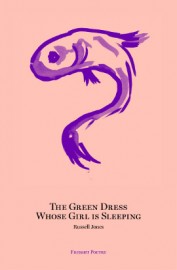The Green Dress Whose Girl Is Sleeping
 Russell Jones’s collection, The Green Dress Whose Girl is Sleeping is much about the serendipitous little moments in life as it is about the huge losses. His constantly changing style enables this; he moves from haiku to couplets in the same way his poems move from quiet moments outside chip shops to moments of contemplation about death and loss. This is Jones’s first full collection of poetry – a fantastic start for an already promising poet. His poems, while fragmented, seem to fit together in an order reminiscent of the cycle of life: beginning with the Creation story in the voice of God, ending with an introspective look at death and love itself. However, while Jones does cover the sadness that comes with mortality, he is also able to capture eloquently happiness in the smallest of pleasures such as the sharing tiramisu with his lover.
Russell Jones’s collection, The Green Dress Whose Girl is Sleeping is much about the serendipitous little moments in life as it is about the huge losses. His constantly changing style enables this; he moves from haiku to couplets in the same way his poems move from quiet moments outside chip shops to moments of contemplation about death and loss. This is Jones’s first full collection of poetry – a fantastic start for an already promising poet. His poems, while fragmented, seem to fit together in an order reminiscent of the cycle of life: beginning with the Creation story in the voice of God, ending with an introspective look at death and love itself. However, while Jones does cover the sadness that comes with mortality, he is also able to capture eloquently happiness in the smallest of pleasures such as the sharing tiramisu with his lover.
The collection itself seems to be a crafted experiment in different styles of poetry and the sound and rhythm of words. His enthusiasm for many of these elements comes from Edwin Morgan whom he regards as a great inspiration. For example “Star” features one sentence which contracts, expands and reverts in accordance with the star shape of the poem. The alliteration and the use of similar words within the poem mean that it is almost impossible to not read it aloud. Again, like Morgan, Jones is handling a very difficult double act in writing a poem which might be called concrete, but is also performative.
In his opening poem “My Secrets as a God” a narrator begins to explain all the horrible things he has seen as God, and ends the poem wishing for forgiveness:
between us. I’d whisper the door
down, call it a miracle. And more
than anything I would ask for your forgiveness [.]
This is an extremely strong opening to this collection. Instead of a beautiful Creationist tale we have a more cynical perspective. However, Jones once again emphasises this through language and rhyming couplets and it is only the last line which doesn’t have a rhyme or half rhyme. This draws attention to the final line where the narrator asks for forgiveness for the pain he has created. Forgiveness is indeed is the central theme of the collection.
While not all of Jones’s poems are so gloomy, some are still laced with sadness. In “On Her Return from Afghanistan” Jones presents us with a snapshot of himself and his sister at a wedding as she tells the guests that she has become immune to the emotional turmoil that presents itself in the war zone. However, the poem then quickly shifts from its long descriptive stanzas centred on the horrors of Afghanistan to a short stanza remembering the pair crying over not being home when their grandmother died. This quick shift in rhythm was as unexpected as the sudden twist in the poem’s subject. The grief of war juxtaposed with the personal and inescapable is deftly done.
As I said earlier, the collection doesn’t always focus on the grim; it even presents an entire section of 26 one word joke poems with the first letter of the question also being the first letter of the answer. This intelligent technique allows for comedy in this collection while still holding true to Jones’s desire to play with words and language in order to intensify his poetry.
These poems offer an honest depiction of life, balancing between the moments of intense pain and the quiet happiness that comes in a small moment with a loved one. If poetry is often challenged to find the personal in the universal, it must be said that Russell Jones is highly successful here. An ever-growing talent… to be watched.
Dervla McCormick

Leave a Reply